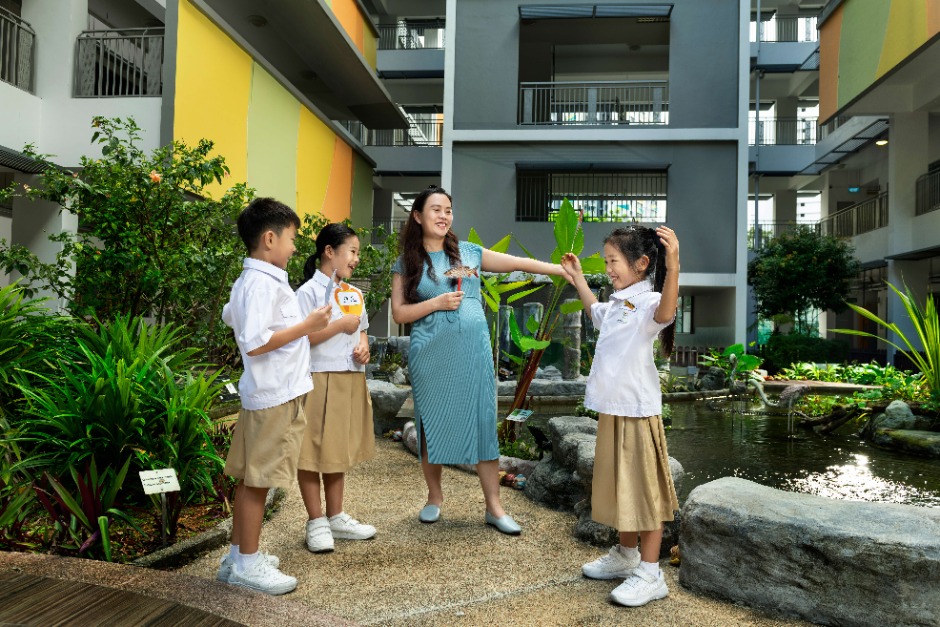Using Drama to Teach Values, in School and at Home
10 Aug 2012

Primary 2 Malay Language pupils in a “freeze frame” activity, acting as family members having a karaoke session scene.
“Ready? Go!” At the signal from their classmates, three Primary 2 Malay Language pupils burst into action. One of them belted out a tune on his toy microphone, while the other two, wearing oversized glasses and wigs, clapped and gyrated along, depicting a family outing at a karaoke session.
The trio then stopped in their tracks and began to take their their cues from Mdm Suraya Rahmat, Malay Language Coordinator at Bukit View Primary School. They spoke only when she tapped them with her pink wand, one by one, to ask them questions such as what they were dramatising in the scene and what other activities they do with their families in real life. The pupils were carrying out “freeze frame”, one of many improvisational drama strategies used to seamlessly inculcate values – such as family togetherness, in this case – into Mother Tongue Language lessons.
To round off the lesson, all the pupils then got up and sang a song on love for the family. “You wouldn’t have guessed that one of the pupils in my class, who is normally shy, would come alive during the drama segments. Everyone finds him so hilarious. When I recorded a session and showed it to his parents, even they were surprised!” shares Mdm Suraya. Not only can drama lead to a discussion about values, it also allows the children to be more confident and develop language competence.
For parents who are keen to adapt some of these educational drama strategies at home to bring out the inner thespian in their children, the team of teachers from Bukit View Primary School offers a few handy tips.

A student in a “hot seat” activity during a Tamil Language lesson takes on questions his classmates ask about the character he is playing.
Improvising and thinking on their feet
One simple technique is called “hot seating”, where a pupil takes on the part of a character in a “hot seat”. In this role, he or she will be asked questions about his or her background, behaviour, thoughts and feelings.
Ms Mumtaz Bte Maideen, the school’s Subject Head for National Education and Community Involvement Programme, relates an instance where her class learned the value of empathy through this technique. “I had a boy who assumed the role of an old and disabled person struggling to get to his seat. He was very convincing in the way he responded about the kind of help that he needed, which was mature for someone his age!”
Another approach is known as “conscience alley”, where the child walks through an “alley” flanked by his friends: one row representing “angels”, the other row representing “devils”. Each side will try to persuade the child to come round to their point of view.
Mrs Teo-Zhang Juan Juan, the Head of Department for Mother Tongue Language, recalls how her Pri 6 class responded to this approach. “They were given the dilemma of whether they should ‘copy’ their homework from others. The students got really excited. One side was throwing comments like ‘You want to watch a movie later, right? So just copy from someone!’ while the other side exhorted the pupil to summon the moral courage to do the right thing,” she recalls. “Everyone had the chance to talk and consider the different ‘temptations’.”

The “conscience alley” technique pits “angels” and “devils” trying to influence the protagonist as she walks down the row.
All in the family
As not all children would be familiar with such drama-inspired activities, Bukit View Primary School planned and organised drama classes for the pupils before using these techniques to incorporate values education in Mother Tongue Language classes. Similarly, parents could prepare their children for drama by role-modelling and also start out with simple activities such as a sing-along session. “I sing to them in the car, even though they might find it weird at first!” Mdm Suraya says with a laugh of how she practises this with her family. Mrs Teo-Zhang chimes in, “I sing, and Daddy does the actions!”
Another way to break the ice is by using props. “Props totally transform them. Just by donning a simple hat or spectacles, students think, ‘They are not looking at me, but my character.’ It makes acting less daunting,” observes Miss Kiew Hui Li Pamela, the Head of Department for English. Mrs Teo-Zhang adds, “Simple props are enough, such as masks from birthday party stores.” Parents can start the ball rolling by putting on the props first and assuming a character themselves.
Ultimately, using drama strategies allows parents to ask open-ended questions that get the child thinking. “Instead of speaking lines from a script, we are free to think and act freely. It is never boring because I get to exercise my creativity,” enthuses Pri 4 pupil Yang Yajie. Ms Chew Hua Jie, a Chinese Language teacher adds, “Encourage children to be outspoken. Try not to brush their ideas aside even though they may have different views.”
Sometimes, children come round when they have internalised the values shown by the characters they take on. Pri 3 pupil Tony Victar Joy acted the part of a character who initially pushed away the fish curry his mother had prepared. “I learnt that we need to show appreciation for what our parents have done for us,” he says. “There was once when my mother cooked a type of curry that I didn’t like because it tastes sour. But I still ate some of it to show my respect for her.”

Mdm Suraya asks her pupils questions about the characters they are playing during the “freeze frame” activity, helping them to speak Malay confidently in a fun way.
Mrs Teo-Zhang also shares how she tackles topics which are open to different views, such as one’s personal attitude to life and happiness. She started this lesson with a story about two brothers; one who was content with his lot, while the younger one was restless to see the world, goes out and amasses riches, but lost it all and came home. Following this story, she would ask her pupils to write a six-line dialogue based on how they would end the story.
“Some pupils get the crux of the story about love and acceptance in the family,” she shares. “Other pupils end the story with the younger brother setting off from home again to find his fortune. The meaning of happiness is different for everyone, but it is important to understand each other’s views.”
For parents who are keen to try out such lessons at home, Mrs Teo-Zhang offers an encouragement, “Don’t be reserved. Just have fun and enjoy the process with your child!”


.jpg)


